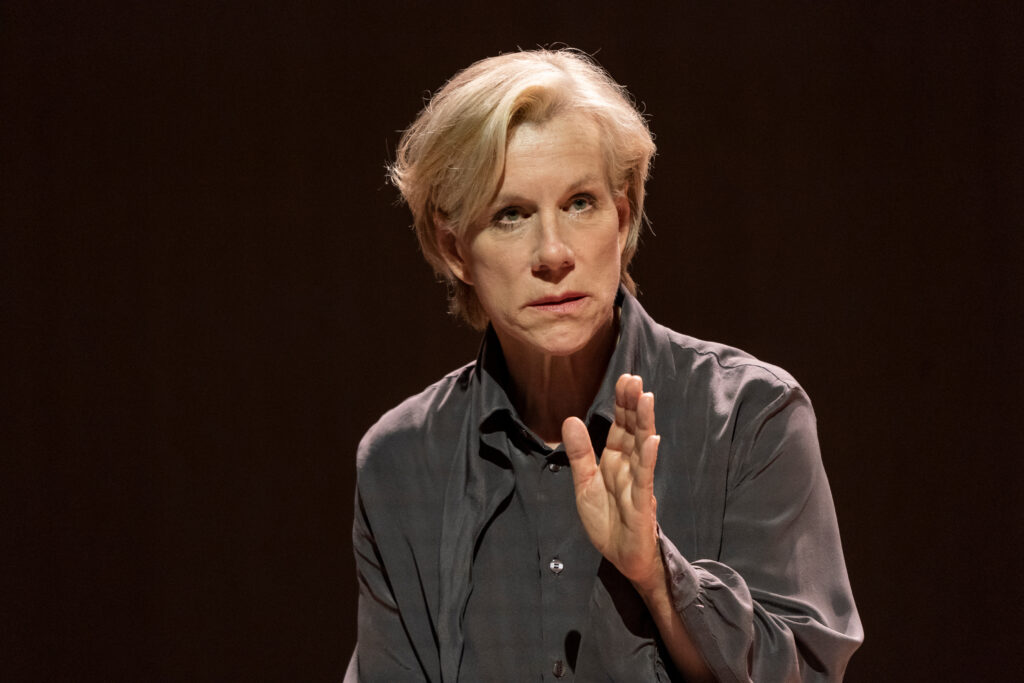Must-see theater: Juliet Stevenson in The Doctor
Juliet Stevenson in her first appearance on the New York stage in 20 years, plays a lesbian medic in a critically-acclaimed play The Doctor by Robert Icke.
Stevenson delivers a commanding performance — which she calls the “role of a lifetime” and which won her the Critics’ Circle Theatre Award in 2019. She plays the eloquent, irascible Dr. Juliet Wolff, who is not only a stickler for grammar and procedure, but absolutely “crystal clear” about her intellectual and professional superiority at the prestigious medical clinic which she leads.
A closeted Jewish lesbian — whose lover, Charlie (Juliet Garricks), never gets her moment in the limelight — Dr. Wolff has risen to the top, blind to her own privilege, but nevertheless feeling marginalized in the world, symbolized when she mentions that she lives in the ‘witch’s house’. She has overcome her sense of imposter syndrome with a strident professional persona but her brilliant career faces an all-too-common witch hunt and cancelation when she makes a particular call regarding the last moments of a 14-year-old patient dying from a self-administered abortion. Is Dr. Wolff acting in the patient’s best interests or is she acting on her own unconscious bias?
The Doctor, which is enjoying its North American premiere after a successful run in the West End, is definitely a play for our times, and surgically investigates the painful intersection of race, gender, science, and faith.
The production is riveting and presented in two portions with a much-needed intermission after a hefty first half. The evening yields passionate and powerful performances largely due to the skill of the cast but also because of the impressive adaptation of source material.
The Doctor is a contemporary update of Arthur Schnitzler’s 1912 play, Professor Bernhardi. Schnitzler, who was a doctor as well as a playwright (Sigmund Freud and Franz Kafka were patients) had a knack for plots that probe the emerging problems of the modern age, such as sexual freedom in La Ronde, and in the case of Professor Bernhardi, the ongoing issue of how to bring personal identity markers into a life of public service.
In the update, playwright-director Robert Icke makes his Jewish doctor protagonist a woman and a lesbian, bringing into play two more minority identities that nevertheless clash with others: a Black priest (John McKay) trying to administer last rites to a dying patient, and a transgender teen (Matilda Tucker) outed in a careless moment of virtue signaling.




Photos: Stephanie Berger/Park Avenue Armory
The casting is richly layered and plays with optics and unconscious bias, with several of the characters in the first half played by their racial and gender opposites, which means the audience is led to revise what they hear based on what they see. A differently-abled woman of color is playing a white cisgender male; a white male is playing a Black doctor (Jamie Schwarz); a Black woman is playing a white man (Doña Croll); a Black man playing a Jewish doctor (Osikanlu Colquhoun), and so on. While this is at first jarring, it has the advantage of making us listen more carefully when characters speak so that we override our own assumptions.
The Doctor is not a medical drama or soap opera in a medical setting. It is an analysis of social systems and how public structures repress “tribes” with a status quo implemented by the powerful few. Icke’s extraordinary and incisive update of Schnitzler’s 110-year-old play, which was banned in Vienna, addresses the increasingly rapid diversification — problematic for institutions, power structures, and individuals who have risen to the top in cloaks of privilege they insist are invisible and acquired through their own excellence rather than through systemic inequities and exclusionary systems of thought.



Stevenson’s deeply-committed performance is dazzling, dangerous, energetic, and surprisingly moving. She clearly relishes the role, which is a stunning tour-de-force that can take its place in the pantheon of recent great roles for women—Jodie Comer in Prima Facie and Cate Blanchett in Tar, which are also portrayals of professional women caught up in problematic power structures. Stevenson is well-supported by a terrific ensemble each of whom who embodies individuals with strong convictions, and so the production comes alive urgently — to use a medical metaphor — like an operating theater, underscored by the sonic lifeblood of Hannah Ledwidge’s live drumming and sound compositions.
The Doctor is now playing at the Park Avenue Armory until August 19. Get tickets here.






